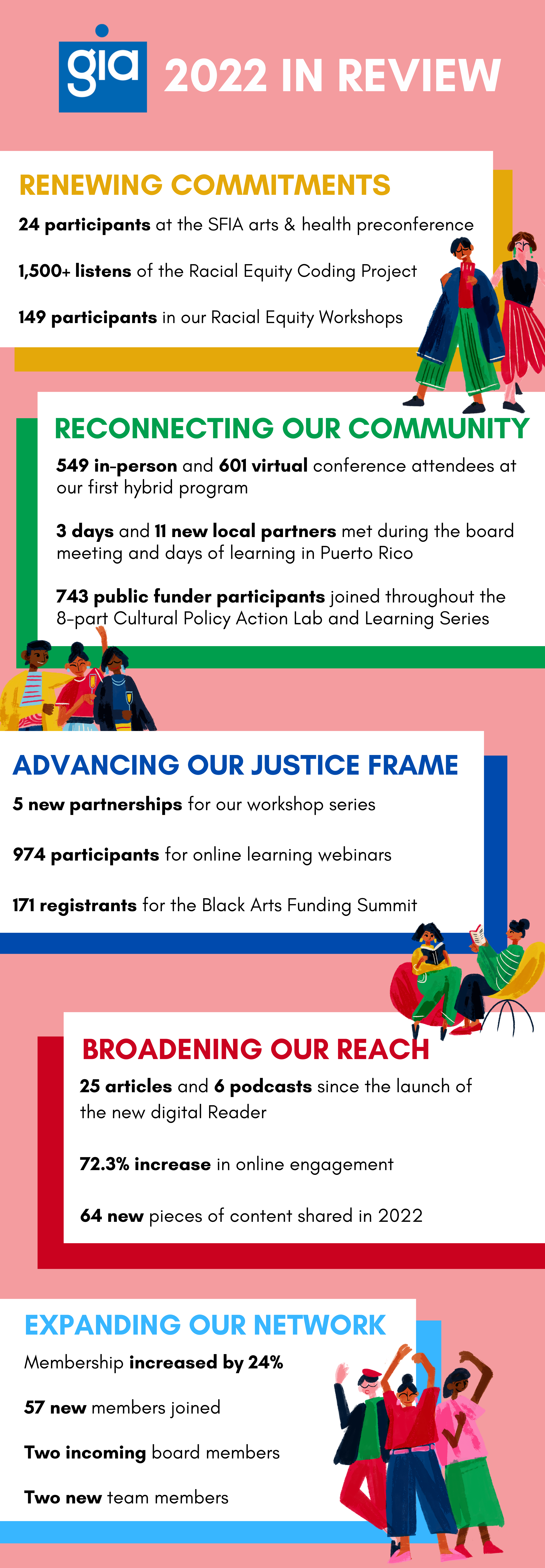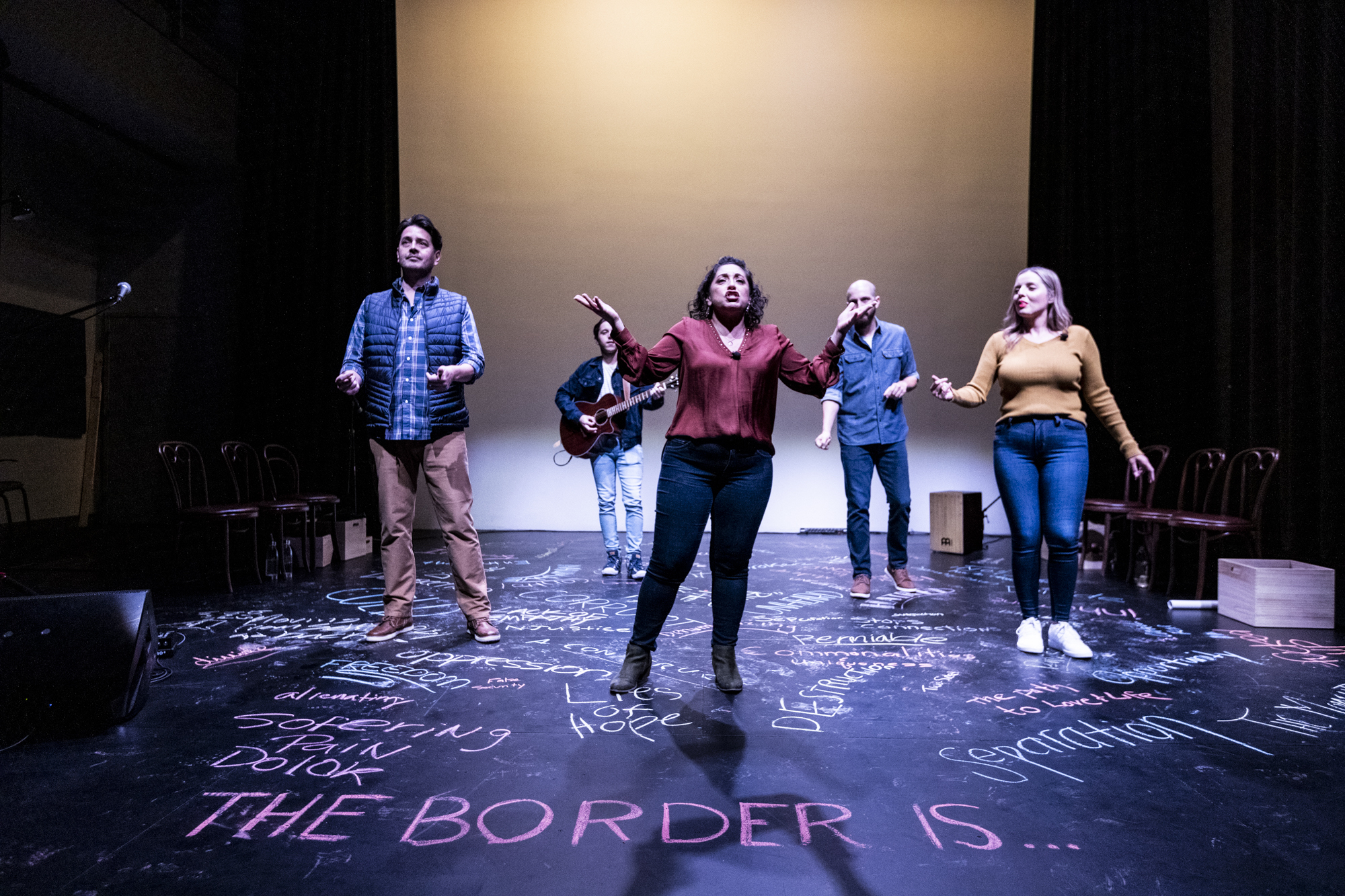
Cheers from Grantmakers in the Arts!
The staff and board of Grantmakers in the Arts would like to wish you a happy and healthy close to this year and warm start to the next. We’re hopeful for a new year to bring us renewed energy and more time together. Before we say goodbye to 2022, here are the major ways GIA evolved its practice.

Renewing Commitments. This year, GIA continued making and tending to relationship with our Puerto Rican partners. The Support for Individual Artist committee focused on arts and health. Our support for BIPOC communities grew with the Racial Equity Coding Project, in partnership with the Doris Duke Foundation, and both of our Racial Equity Workshop Series. We resumed the Narrative Change series which marked our most attended webinar of the year, on participatory grantmaking, and introduced three inaugural guest editors for the digital Reader.
Reconnecting Our Community. To begin our 2022 hybrid conference, Converge/Transform, we asked ourselves: What do we need? And, what do creative communities need? How are we, as stewards of wealth and holders of power, using our imaginations to build a present and future that will redress past and present struggle? Converge/Transform was held virtually and in-person in NYC. We featured four preconference sessions, including Year of Our Lorde, which has a recap podcast now streaming on the digital Reader. The convening was documented by our bloggers, Jasmine Liu and Tram Nguyen; photographers, Michael Palma Mir and Ayana Hisa; and graphic recorders Sara Yukimoto-Saltman and Toya Beacham. Our final board meeting and days of learning for the year was hosted in Puerto Rico in preparation for our 2023 conference November 5-8, 2023.
Advancing Our Justice Frame. GIA continued the Pro-BIPOC Arts Funding Workshop series in partnership with Justin Laing (Hillombo Consulting), an advancing racial equity workshop grounded in critical race theory as the conceptual frame and organizing as the action. We also launched the Move the Money series with Art.Coop and the Mission Investing Institute with Mission Investors Exchange and Upstart Co-Lab, both exploring ways to work outside of traditional grantmaking practices to better support artists and cultural communities. We welcomed the inaugural cohort of the Cultural Policy Action Lab and Public Learning Series, a leadership and professional development community of practice program for public sector workers who seek to advance racial equity through arts, culture, and public policy. To close out the year, we hosted our first Black Arts Funding Summit, featuring experts across fields and industries who have directly shaped institutional policy and established new practices that support Black liberatory futures.
Broadening Our Reach. This year, GIA launched our digital Reader platform making content more accessible, and enabling us to share audio, video, photos, written essay, and graphic recording. We introduced three guest editors; Dr. Durell Cooper, Meena Malik, and Nayantara Sen. Our Special Series featured: Arts + Tech, Future of the Field, Black August, Liberatory Practice, The Lost Files with Durell Cooper, and The President's Blog.
Expanding Our Network. GIA's membership increased by 24% during 2022. We continue our monthly Member’s Spotlight series, highlighting the work of GIA members across the sector. We honored outgoing board members Jaime Dempsey and Ken May, welcomed incoming board members Amber Hamilton and Glenisse Pagán Ortiz, as well as Eleanor Savage who will begin as vice chair in January.
Building From Within. GIA welcomed two new team members, Jaime Sharp and Mar Undag, and said goodbye to Sylvia Jung, Steve Cline, and George Marfo II. Our team has also been active in the field; Eddie Torres joined the board of directors of United Philanthropy Forum; Nadia Elokdah served on the WOCA Non-Black POC Solidarity steering committee and selection committee for Creatives Rebuild New York; Sherylynn Sealy served on the steering committee for EPIP Boston Chapter; Champ Knecht published reports on GIA's general operating support; Jaime Sharp joined BIPOC Leadership Circle with artEquity and WOCA's Leadership Through Mentorship program.
Thank you for your contribution to our community of practice and for your continued support of artists and arts organizations. Before we’re off, check out a snapshot of our year together below and share with us some of your best successes. Our office will be closed from December 23-January 2, 2023, for the winter holiday, and the next time you hear from us will be in the new year. Until then!
Photo Courtesy: Thomas S. Kenan Institute for the Arts | Credit: Owens Daniels Photography

"At the Robert Sterling Clark Foundation, we know that strong leadership is necessary to create a more equitable and vibrant New York City..."
From the Alliance for California Traditional Arts: "Every cultural community in the United States is rooted in a sense of belonging, shared by members, and anchored by collective wisdom and aesthetics. These roots of cultural heritage are maintained, strengthened, and expanded through the practice of folk and traditional arts. The realities of slavery, displacement, structural racism, systemic poverty, and cultural appropriation have tested the strength of these cultural roots. The stresses are even more apparent, viewed against our present-day national reckoning with these harms amidst a global pandemic. In this context, traditional arts practices are potent political acts of social belonging, power, and justice. From this field have emerged works and artists of beauty, technical prowess, and meaning..."
Forecast Public Art has released Issue 5 of FORWARD, "a digital publication and conversation series from Forecast, a nonprofit that activates, inspires, and advocates for public art that advances justice, health, and human dignity." "FORWARD highlights how artists are partnering with cities, institutions, and communities to courageously tackle the vital issues of our time. This fifth issue, made in collaboration with NeighborWorks America, focuses on housing..."
From the Toronto Arts Council: "As the newest wave of protests by Black bodies sets the world ablaze in 2020 once again, loudly demanding the right to live, work, play and in the case of this report, make art, organizations both public and private seem to be taking yet another step towards equity for Black bodies. Toronto Arts Council (TAC) is no exception and is showing leadership as it steps up to acknowledge its own shortcomings in support of Black Artists by designing a new grant program stream specifically for Black artists/arts organizations, which according to 90% of participants in the consultations that inform this report, is very much needed..."
"The movement for reparations in the United States—a Black-led movement that began even before slavery’s end—is making unprecedented strides forward, and governments across the country are beginning to act. In October 2020, California became the first state to initiate an official task force to study and develop a reparations plan for Black Americans harmed by slavery and its legacies," said Aria Florant and Venneikia Williams for Nonprofit Quarterly. "In March 2021, the city council in Evanston, Illinois, approved the Local Reparations Restorative Housing Program to address racial discrimination in housing. In April 2021, HR 40 was voted out of committee for the first time in its 32-year history. If passed, the bill would establish a commission to study the negative effects of slavery..."
From the New York Times: "Maricruz Rivera Clemente’s community was among those hit hard by Hurricanes Irma and Maria in 2017."
"She and her neighbors in Piñones, a neighborhood in Loíza on the northeastern coast of Puerto Rico, about 15 miles east of San Juan, were without power for months..."
From the National Endowment for the Arts: "This profile features U.S. and state-level estimates of arts participation rates from the 2020 Arts Basic Survey. The Arts Basic Survey (ABS) is a short-form edition of the Survey of Public Participation in the Arts (SPPA), which typically has been conducted on a five-year basis. The ABS and the SPPA are designed by the National Endowment for the Arts and fielded by the U.S. Census Bureau as a supplement to the Current Population Survey..."
